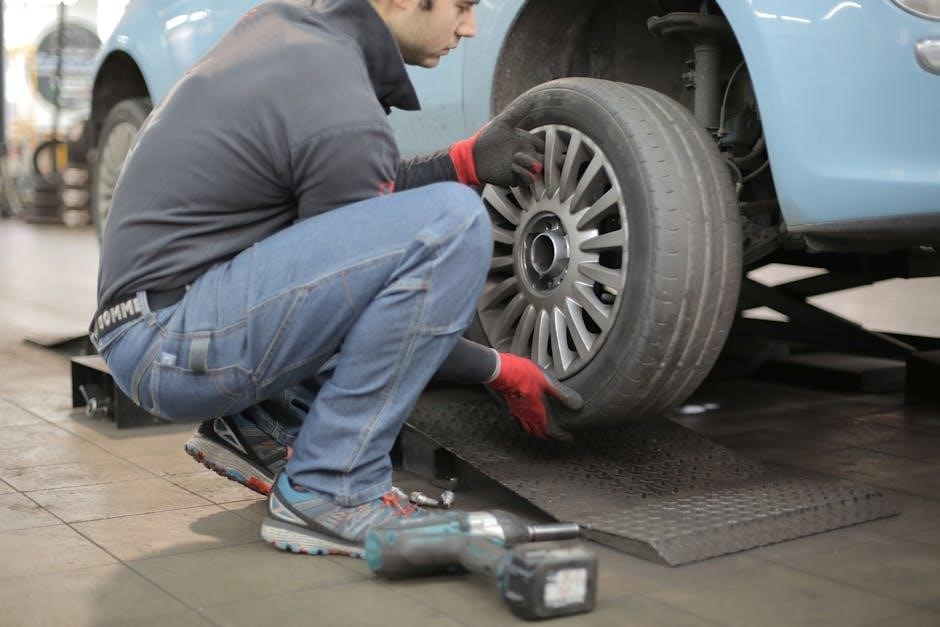The Nissan Service Maintenance Guide is designed to help owners ensure their vehicle receives proper care, maximizing performance and longevity. It provides tailored recommendations for maintenance.
1.1 Importance of Regular Maintenance

Regular maintenance is essential to ensure your Nissan runs efficiently, safely, and reliably. It helps prevent mechanical issues, reduces repair costs, and extends the lifespan of your vehicle. By following the recommended schedule, you can maintain optimal performance, improve fuel efficiency, and ensure all systems function correctly. Neglecting routine maintenance can lead to unexpected breakdowns, increased emissions, and higher expenses. Proper care also enhances safety on the road, as critical components like brakes and tires are inspected and serviced. A well-maintained vehicle retains its value better, providing peace of mind and confidence in its reliability. Consistency is key to protecting your investment.
1.2 Overview of Nissan Maintenance Schedule
Nissan’s maintenance schedule is structured around specific time and mileage intervals to ensure your vehicle receives the care it needs. Services are recommended at intervals of 5,000 to 10,000 miles or every 6 to 12 months, depending on the model and usage. The schedule includes routine checks for engine oil, tire rotation, brake fluid, and air filters, as well as inspections for belts, hoses, and other critical components. By adhering to this schedule, you can prevent potential issues, ensure optimal performance, and maintain your vehicle’s reliability over time. Nissan’s approach is designed to be proactive, addressing needs before they become major concerns.

Nissan Recommended Maintenance Schedule
Nissan’s maintenance schedule outlines essential services at specific intervals, ensuring optimal vehicle performance and longevity. Regular checks and timely replacements are crucial for maintaining reliability and safety.

2.1 5,000 Miles or 6 Months Service
The 5,000-mile or 6-month service is a foundational maintenance checkpoint. It typically includes an oil and filter change using high-quality synthetic oil, tire rotation to ensure even wear, and a brake fluid inspection. Additionally, a thorough vehicle inspection is conducted to identify any potential issues early. This service helps maintain the vehicle’s performance, fuel efficiency, and overall health. Regular completion of this service supports the longevity of your Nissan and ensures it runs smoothly under various driving conditions.
2.2 10,000 Miles or 12 Months Service
The 10,000-mile or 12-month service builds on the initial maintenance by including more comprehensive checks. It involves replacing the engine oil and filter, rotating the tires, and replacing the brake fluid for optimal braking performance. Additionally, inspections of the CVT fluid, axle, and suspension parts are conducted to ensure proper vehicle functionality. This service also includes checking and replacing the in-cabin microfilter to maintain air quality inside the vehicle. Using high-quality synthetic oil is recommended to enhance engine performance and longevity. Regular completion of this service helps prevent potential issues and keeps your Nissan running smoothly.
2.3 15,000 Miles or 18 Months Service
The 15,000-mile or 18-month service includes essential maintenance to ensure your Nissan continues to perform optimally. This service involves replacing the engine oil and filter, rotating the tires, and replacing the brake fluid to maintain braking efficiency. Additionally, the in-cabin microfilter is replaced to improve air quality inside the vehicle. Inspections of the CVT fluid, axle, and suspension parts are also performed to identify any potential issues early. Using high-quality synthetic oil is recommended to protect the engine and extend its lifespan. Regular completion of this service helps maintain your vehicle’s reliability and performance on the road.
2.4 20,000 Miles or 24 Months Service
The 20,000-mile or 24-month service is a comprehensive check to ensure your Nissan remains in excellent condition. This service includes replacing the engine oil and filter, rotating the tires, and replacing the brake fluid to maintain optimal braking performance. Inspections of the CVT fluid, axle, and suspension parts are conducted to identify any wear or damage. Additionally, using high-quality synthetic oil is recommended to protect the engine and extend its lifespan. Regular completion of this service helps prevent potential issues, ensuring your vehicle runs smoothly and maintains its overall health and performance on the road.

Key Maintenance Services
Essential services include oil and filter replacement, tire rotation, and brake fluid checks to ensure optimal performance, safety, and longevity of your Nissan vehicle.
3.1 Oil and Filter Replacement
Regular oil and filter replacement is crucial for maintaining your Nissan’s engine health. Nissan recommends using high-quality synthetic engine oil for all services. This ensures optimal performance, fuel efficiency, and protects the engine from wear and tear. The oil filter should be replaced at every service interval to maintain cleanliness and prevent contamination. By following the recommended schedule, you can avoid premature engine damage and keep your vehicle running smoothly. Proper oil maintenance is essential for extending the lifespan of your Nissan and ensuring it operates at its best for years to come.
3.2 Tire Rotation and Inspection
Tire rotation and inspection are vital for ensuring even tread wear, improving handling, and extending tire life. Nissan recommends rotating tires every 5,000 to 10,000 miles, depending on driving conditions. During this service, technicians inspect for signs of uneven wear, damage, or misalignment. Proper rotation ensures balanced performance and prevents premature tire replacement. Additionally, tire pressure should be checked and adjusted to manufacturer specifications. Regular inspections help identify potential issues before they become costly repairs, ensuring your Nissan maintains optimal traction, fuel efficiency, and safety on the road. This routine maintenance is essential for maximizing tire longevity and overall vehicle performance.
3.3 Brake Fluid Replacement
Brake fluid replacement is a critical maintenance task to ensure your Nissan’s braking system functions safely and efficiently. Over time, brake fluid can become contaminated with moisture, which can lead to reduced braking performance and potential system damage. Nissan recommends replacing the brake fluid every 10,000 to 15,000 miles or as specified in your vehicle’s maintenance schedule. During this service, technicians will drain the old fluid, inspect the brake system for leaks or wear, and refill it with Nissan-approved brake fluid. Regular replacement helps maintain optimal braking performance, prevents corrosion, and ensures your safety on the road. This service is essential for reliable vehicle operation.
3.4 Air Filter and Microfilter Replacement
Regular replacement of the air filter and microfilter is essential for maintaining your Nissan’s performance and interior comfort. The engine air filter ensures clean air enters the engine, improving fuel efficiency and performance. The cabin air microfilter cleans the air inside the vehicle, reducing dust, pollen, and odors. Nissan recommends replacing the engine air filter every 15,000 to 30,000 miles, depending on driving conditions. The microfilter should be replaced every 12,000 to 18,000 miles or as needed. Dirty filters can decrease performance and comfort, so timely replacements are crucial. Use Nissan-approved filters for optimal results and ensure your vehicle operates efficiently while maintaining a clean cabin environment.

Additional Maintenance Requirements
Beyond regular services, Nissan recommends inspecting spark plugs, transmission fluid, and drive belts. Coolant replacement is also necessary at higher mileages to ensure optimal engine performance and longevity.
4.1 Spark Plugs and Ignition System Check
Spark plugs play a crucial role in your Nissan’s performance. Worn or fouled spark plugs can lead to reduced fuel efficiency, rough engine idling, and decreased power. Nissan recommends replacing spark plugs at intervals ranging from 30,000 to 105,000 miles, depending on the model and driving conditions. Additionally, the ignition system should be checked regularly to ensure proper function. This includes inspecting spark plug wires, ignition coils, and the distributor cap (if applicable) for signs of wear or damage. Replacing these components as needed ensures consistent engine performance and prevents costly repairs down the road. Always use genuine Nissan parts for optimal reliability.
4.2 Transmission Fluid Check
Regular transmission fluid checks are essential for maintaining smooth gear shifts and preventing overheating. Nissan recommends inspecting the fluid every 30,000 to 60,000 miles. The fluid level and condition should be checked using the dipstick or consult the owner’s manual for specific instructions. If the fluid appears dirty, discolored, or has a burnt smell, it should be replaced promptly. Using genuine Nissan transmission fluid ensures compatibility and optimal performance. Additionally, the transmission filter may need replacement at similar intervals to prevent clogs and maintain proper flow. Regular checks can help prevent costly repairs and ensure the longevity of your Nissan’s transmission system.
4.3 Drive Belt Inspection
Regular inspection of the drive belts is crucial for ensuring the proper functioning of your Nissan’s engine. The serpentine belt powers essential systems like the alternator and water pump. Inspect for cracks, fraying, or excessive wear every 15,000 to 30,000 miles. If damage is found, replace the belt immediately to avoid breakdowns. Additionally, check the belt tension to ensure it’s within the manufacturer’s specifications. Nissan recommends replacing the drive belt at 105,000 miles or 84 months, whichever comes first. Neglecting this can lead to costly repairs if the belt fails. Always use genuine Nissan parts for reliability and longevity.

Personalized Maintenance Schedule
A personalized maintenance schedule tailors service intervals to your Nissan’s specific needs, considering mileage, driving habits, and local conditions for optimal vehicle care and performance.
5.1 Factors Affecting Maintenance Intervals
Several factors influence the frequency of Nissan maintenance intervals, including mileage, driving conditions, and vehicle configuration. High mileage or extreme weather can accelerate wear, requiring more frequent services. Additionally, towing trailers or driving in stop-and-go traffic may necessitate earlier interventions. Local conditions, such as salty roads or high temperatures, also play a role in adjusting schedules; Nissan dealers assess these variables to customize maintenance plans, ensuring optimal vehicle performance and longevity. Regular inspections help identify specific needs, allowing for personalized adjustments to the standard maintenance intervals.
5.2 Nissan Dealer Assistance for Custom Schedules
Nissan dealers offer personalized assistance to create tailored maintenance schedules, ensuring your vehicle’s unique needs are met. Their expertise allows them to adjust service intervals based on driving habits, local conditions, and vehicle specifications. By analyzing mileage, usage patterns, and specific requirements, dealers provide customized plans that enhance performance and longevity. They also use advanced diagnostic tools to identify potential issues early, preventing costly repairs. With flexible scheduling and genuine Nissan parts, dealers ensure your maintenance experience is efficient and reliable, keeping your car in optimal condition throughout its lifespan.
Adhering to the Nissan Service Maintenance Guide ensures optimal performance and longevity. Regular maintenance enhances safety, efficiency, and overall vehicle health. Owners should consult Nissan professionals for personalized care.
6.1 Benefits of Following the Maintenance Guide
Following the Nissan Service Maintenance Guide offers numerous benefits, including improved vehicle performance, better fuel efficiency, and extended longevity. Regular maintenance ensures early detection of potential issues, preventing costly repairs. It also enhances safety by addressing wear and tear on critical components like brakes and tires. Additionally, adhering to the schedule maintains your vehicle’s warranty and resale value. Proper maintenance reduces the risk of breakdowns, providing peace of mind. By staying on track with recommended services, you optimize your Nissan’s reliability and overall driving experience. This proactive approach ensures your vehicle remains in prime condition for years to come.
6.2 Final Tips for Vehicle Longevity
To ensure your Nissan lasts for years, consider these final tips: Always follow the recommended maintenance schedule and adapt it to your driving habits. Use genuine Nissan parts for replacements to maintain quality and reliability. Regularly inspect fluids, belts, and tires, even between scheduled services. Avoid extreme driving conditions when possible, as they can accelerate wear. Keep a maintenance log to track services and identify patterns. Address any unusual noises or warning lights promptly. By combining these practices with the guide’s recommendations, you’ll enhance your vehicle’s health and performance over time, ensuring it remains reliable and efficient for years to come.
